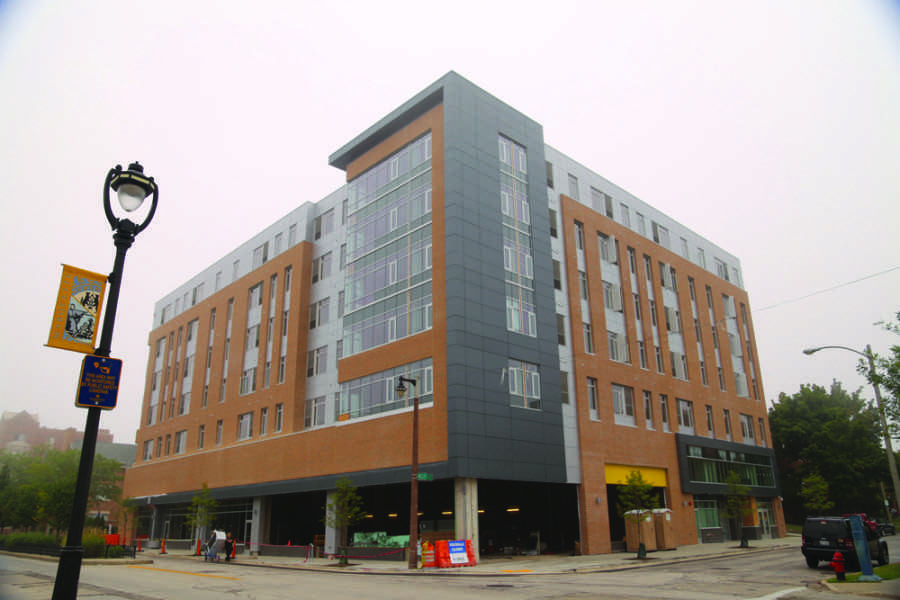Divine Abizera, a junior in the College of Arts & Sciences, is experiencing luxury housing as a student on campus.
She lives in The Marq, formerly known as the 2040 Lofts, which recently underwent changes, including upgraded Wi-Fi and a redesigned gym.
The student housing company Campus Advantage acquired the building last spring, boasting “living in luxury” on its website. Emphasis on luxury living is a trend at Marquette — as well as a national movement in student living that is impacting local economies.
Although she pays rent on her own, Abizera recognizes that there is stigma associated with living at a higher-end property like The Marq.
“I think people have the perception that I have my parents at my beck and call to support me all the time,” Abizera said.
Her situation illustrates a different aspect to the rise in luxury student housing: demand.
Michael Southern, leasing manager for The Marq, said the building’s luxury changes were prompted by surveys and feedback forms from its residents.
“It was just a little outdated,” Southern said. “New ownership allowed us to make changes.”
On top of the new amenities, students also said there is a degree of pride that comes with paying for their own apartment.
Arianna Lee, a senior in the College of Engineering, said summer internships have helped her reach an arrangement where she pays part of her rent along with her parents. She said this arrangement allowed her flexibility when choosing an apartment.
“I definitely would have thought more into it (if I was paying independently) because it is a bit expensive if you’re paying by yourself,” Lee said.
THE ECONOMICS OF STUDENT RENTERS
David Clark, an economics professor and consultant to the Wisconsin Realtors Association, said student renters can provide a community with many benefits, along with some negatives.
Among those benefits are providing communities with stability, but because of less community attachment, this can create problems of noise or traffic. Luxury apartments, Clarke said, can reduce some of those negatives.
“When you think of a rental property that is marketed to attract a clientele that is less likely to be generating some of those negative consequences, you’re going to be paying a relatively high rent and you’re probably going to have a higher security deposit,” Clark said.
Clark said it is the developers’ responsibility to determine whether or not a neighborhood can sustain comparatively luxurious options.
“There’s a very easy way to rent (out) an apartment and that’s to lower the rent,” Clark said. “If you’re coming in at price point that’s too high, you’ll get a market signal and you’ll have vacancies.”
The question still stands: with an increase in luxurious options around campus, what does that mean for the city as a whole?
“I think any time you’re seeing development, that’s generating additional economic activity,” Clark said. “That tends to be something that is good for the community.”
Clark added that, although developers sometimes make mistakes and some properties do not turn profits, there usually is market research that is performed before purchasing properties. This research allows owners to make informed decisions concerning the rental rates of their complexes.
“If you have an evolving trend, usually that’s an indication that these decisions are generating profitable outcomes,” Clark said.
There are also multipliers in the economy that are created by housing development. For example, construction stimulates the economy, raising property values and attracting more business to an area.
New housing can also attract money from other areas in the country. If a student’s parents pay the rent or send them money, the money is coming into the community from an outside source.
Clark said attracting outside money is a large part of a city planner’s job, as is attracting student spending.
“If you’re evaluating the Milwaukee area and dollars are getting injected in, those are going to be dollars that are not spent at some other out-of-state or out-of-city location,” Clark said. “So the multiplier effect is going to be stronger if they’re from outside the community.”
HOW PRICING WORKS FOR LUXURY HOUSING
Thomas Myers, a 2013 economics graduate, spent part of his last few years on campus studying student housing trends and prices in the Marquette area. He used 90 apartment rental leases from 2012-’13 to analyze what factors contribute to rent prices in the local Marquette community.
The factors include distance, additional bedrooms and bathrooms, full kitchens, square footage and access to nightlife. In particular, Myers said that property values decline when heading west of 21st Street, resulting in a 25 percent decrease.
“Milwaukee is clearly more than just a college town, which is why the distance aspect is direction,” Myers said in a paper on his study. “As one moves west, property values should decline, however, when moving east property values should increase.”
Myers included the former 2040 Lofts as an example of large luxurious apartments. He accredited the increase to the size of those apartments and the amenities offered.
“The primary regression results suggest that (the former) 2040 Lofts apartments have 47.8 percent higher prices than the general market,” Myers said in the paper.
Myers said the increase over the general market results in an additional rent payment of approximately $863 every month.
Myers also analyzed the relative prices of studio apartments as compared to one, two, three and four bedroom apartments. He found evidence of relative price increases, noting “as rent is split between larger numbers of roommates, the price per occupant generally declines even though overall rent increases.”
Overall, the study suggests students weigh what they place value on and use cost-benefit analysis to decide what they value most.
LIVING ALONE
Another form of luxury — outside of high-end amenity apartments on campus — can be living alone on campus.
For Stephanie Schmidt, a senior in the College of Nursing, living without roommates in an off-campus studio apartment made the most sense. For her clinical courses, Schmidt had to wake up early, sometimes at 5 a.m.
Still, Schmidt said finances played very much into her apartment search. She does not receive financial support from her parents and works at the library on top of applying for scholarships and grants.
“I don’t like to spend a lot of money and I pay for college myself,” Schmidt said. “Finding an affordable housing situation was really crucial for me. I’ve got to make ends meet somehow.”
Others, like Marcia Kreifels, a senior in the College of Communication, said she wanted her own space because she is used to living alone. She is the youngest child in her family and the sister closest in age to her is six years older.
“It’s nice to have control over your own situation,” Kreifels said. “You don’t have to worry about bothering anyone or navigating situations with your roommates. I like to have my own space — it’s all my own stuff in there.”
The challenge to this type of living, though, is keeping close with people they met during freshman and sophomore year.
“I have to make more of an effort to see my friends,” Kreifels said. “But I have multiple groups of friends on the same block.”
While Kreifels said Marquette isn’t too big to make staying in contact with friends difficult, she said she would consider living with roommates in the future to save money.
Schmidt, on the other hand, said she plans to continue living on her own.
“I plan to live independently until I’m married,” Schmidt said. “I just really like being able to come back to my space and being able to chill on my own.”





